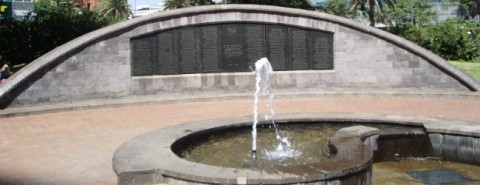"How could they thank God?"

“Nairobi has been bombed,” said Amina Bakari, my Kenyan host mother. She was outside, as she was most mornings, preparing the fire in the small tin charcoal stove. Her voice was slow and calm, but the uncharacteristic silence that followed shouted her anxiety. Mama, as I affectionately called her, began to quietly chant Muslim prayers as she paced on the concrete behind her home.
I’d woken up late that day, 15 years ago today. I was a 20-year-old exchange student living with a Nairobi family. I had planned to visit the American embassy that morning to mail letters home, because the post office was notorious for long lines. Two weeks before, my pale skin and American accent had granted me the privilege of dropping mail at the embassy’s front desk.
Neighbors said there were two explosions. The first was a hand grenade that brought out the curious. Then a truck bomb exploded in front of the embassy, and glass poured like rain into the eyes and limbs of the curious.
Approximately 212 were killed—including 12 Americans—and an estimated 4,000 were wounded. The American embassy in Dar es Salaam, Tanzania, was bombed within 10 minutes of the attack in Nairobi. Eleven Tanzanians were killed and 85 wounded. Al-Qaeda claimed responsibility for both bombings.
Because electricity in our neighborhood was rationed that morning, it was hours before our television came on. The footage looked like a low-budget horror movie. Rows of Kenyans in business suits walked away from the scene. Blood ran from their heads like streams on a map. There was no screaming; their eyes said everything. A pregnant woman sat on the curb, her bright fuchsia dress baptized in blood.
That weekend Mama and I attended a Muslim funeral of a Kenyan who had died in the embassy. At the funeral, women kept repeating “Al-hamdu lillahhi rabbil ‘alamin,” an Arabic phrase to give praise and thanks to God.
When we got home I asked Mama, “How could they thank God rather than question God?”
“Everyone will taste death,” she responded. “So instead of talking like, ‘Oh, what will I do now that that person is gone?’ Go back to God and say, ‘Al-hamdu lillahhi.’ You are thanking God for all his mercies, even at death, for everything. In the midst of this tragedy, God spared you. He is giving you air, he is giving you food, he’s giving you everything. You are even able to bury that person.”
We watched television for days. I was hoping that one day we’d feel better. My idealistic and naïve mind thought maybe something could change. It felt like we were living an endless Good Friday, and we were awaiting an Easter to make things normal again. But every morning I woke up feeling like a gutted tree, hollow.
I continued to press Mama in the weeks that followed. “Why aren’t you questioning God?”
“An African has always been with God. An African has suffered a lot: colonialism, drought, being ruled by brutality. After all this suffering, they only find that it’s only God that is with them.”
Then she said something I’d never heard before: “God doesn’t need you. You need God.”
I cringed. My 20-year-old American mind could not comprehend that I wouldn’t be needed. I grew up in Sunday School classes learning that God needed each of us to do God’s work.
And it never occurred to me before that I needed God. In the U.S., God was marketed like a Happy Meal. Faith was a choice. As a middle-class, white American, I did not face issues Kenyans navigated: school fees, high crime, corrupt police, a dismal economy. In Kenya, daily uncertainty seemed to require a higher power.
In the 15 years since then, I have experienced both heartbreak and miracles. I have come to realize that I need God—and that I’m not sure what God needs. Through spiritual practices, I find a peace that defines God for me. I experience God in the words of the greeting that Muslims share: As-salam alaykum, “peace be upon you.”
A few weeks after the bombing, I saw a professor and asked where she was during the bombing. She had been driving a few miles away from the embassy. She shook her head, paused and said, “By the grace of God go I.”
Although I had heard that saying a million times, it meant nothing until that moment. “By the grace of God go I,” I repeated. Mama would have agreed.




